Fleurs du Mal Magazine


![]()
Kom kinderstadsdichten
tijdens workshop
‘Schrijven voor je wijk’
Win een meet&greet met Yes-R!
In het kader van de zoektocht naar de nieuwe Kinderstadsdichter voor
Tilburg vindt op woensdagmiddag 20 april de workshop ‘Schrijven voor je
wijk’ plaats.
Kinderen zetten die middag onder leiding van docenten van het Factorium
samen een zelfgeschreven gedicht over hun wijk op muziek. Er wordt op
twee locaties tegelijk gewerkt aan een tekst, in bibliotheek Heyhoef en
in bibliotheek ‘t Sant. Vervolgens voeren de groepen het resultaat via
een live videoverbinding voor elkaar op. Een onafhankelijke jury wijst
een winnaar van deze ‘battle’ tussen de ‘biebs’ aan. Kinderstadsdichter
Sara Bidaoui zal ook aanwezig zijn. Er kan maar een beperkt aantal
kinderen deelnemen aan de workshop, dus geef je snel op.
De winnaars krijgen in augustus de kans om de bekende rapper en acteur
Yes-R te ontmoeten. Op woensdag 31 augustus zal hij namelijk optreden
tijdens de officiële benoeming van de nieuwe Kinderstadsdichter van
Tilburg. De winnaars van de workshop zullen hem die middag de hand
mogen schudden.
Het thema van de workshop ‘Schrijven voor je wijk’ is afgeleid van de
titel van de Kinderstadsdichtwedstrijd 2011: ‘Mijn stad, mijn thuis’.
Alle kinderen tot en met 12 jaar uit Tilburg en omstreken die graag
gedichten schrijven en het ook leuk vinden om ze voor te dragen kunnen
deelnemen aan de Kinderstadsdichtwedstrijd. Meedoen aan deze
dichtwedstrijd is dus ook een uitgelezen kans om straks zelf naast
Yes-R op het podium te staan! Er kunnen nog tot en met 31 mei gedichten
ingestuurd worden.
Meer informatie over de wedstrijd is te vinden op:
►www.kinderstadsdichter.nl
De wedstrijd wordt georganiseerd door
Stichting P.J. Cools, Bibliotheek Midden-Brabant en Cultuurconcepten.
![]()
*Workshop Schrijven voor je wijk*
Datum en tijd: 20 april, 15:00 -16:30 uur
Deelname is gratis, je kunt je aanmelden door een mail te sturen met je
naam, adres en leeftijd naar: sant@bibliotheekmb.nl
Locaties:
Bibliotheek Heyhoef
Kerkenbosplaats 3
5043 RX Tilburg
Bibliotheek ‘t Sant
Beneluxlaan 74
5042 WS Tilburg
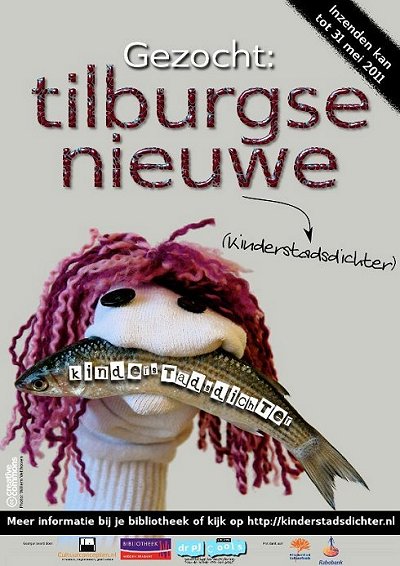
fleursdumal.nl magazine
More in: Art & Literature News, City Poets / Stadsdichters, Kinderstadsdichters / Children City Poets
.jpg)
William Shakespeare
(1564-1616)
THE SONNETS
74
But be contented when that fell arrest,
Without all bail shall carry me away,
My life hath in this line some interest,
Which for memorial still with thee shall stay.
When thou reviewest this, thou dost review,
The very part was consecrate to thee,
The earth can have but earth, which is his due,
My spirit is thine the better part of me,
So then thou hast but lost the dregs of life,
The prey of worms, my body being dead,
The coward conquest of a wretch’s knife,
Too base of thee to be remembered,
The worth of that, is that which it contains,
And that is this, and this with thee remains.
![]()
kempis.nl poetry magazine
More in: -Shakespeare Sonnets
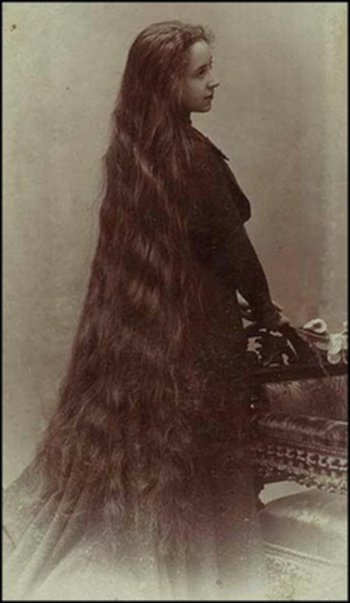
Camera obscura: Hair
fleursdumal magazine
More in: Camera Obscura
![]()
Gemeentemuseum Den Haag
László Moholy-Nagy
De kunst van het licht
t/m 1 mei 2011
Licht als kunst en kunst als licht. László Moholy-Nagy (1895-1946) speelde zijn leven lang met licht in zijn kunstwerken, of het nu ging om schilderijen, sculpturen, collages, foto’s, films, grafiek, boekomslagen of theaterdecors. Wat het potlood is voor de tekenaar is licht voor Moholy-Nagy. Hij leefde in de boeiende overgang naar de moderne tijd; het interbellum, de periode van beroemde kunstbewegingen als Bauhaus en De Stijl. Moholy-Nagy was een echte wereldburger, zijn leven was één lange reis, van zijn geboorteland Hongarije, naar Wenen, Berlijn, Amsterdam, Londen en Chicago. Soms opgejaagd door een dreigend politiek klimaat, dan weer op zoek naar een nieuwe artistieke uitdaging. Moholy-Nagy was een alleskunner, naast beeldend kunstenaar was hij ook intellectueel, criticus, denker en leraar, maar bovenal utopist. Aan de hand van meer dan 180 objecten uit 30 verschillende internationale collecties geeft het Gemeentemuseum Den Haag een groots overzicht van zijn artistieke nalatenschap.
László Moholy-Nagy introduceerde fotografie en film, met licht als essentieel ingrediënt, als hét beeldende middel van zijn tijd. Door toepassing fotografie en film werd kunst in één klap bereikbaar voor iedereen. Deze democratisering van de kunsten paste in het utopisch denken van Moholy-Nagy. Kunst was voor hem onderdeel van een levenshouding, een collectieve mentaliteit waarin kunst en alle andere aspecten van het leven samenvloeien in een Gesamtkunstwerk of, beter nog, Gesamtwerk, wat zou leiden tot gezamenlijke vooruitgang. Hij was overtuigd van de vormende functie van kunst. ‘Kunst is de slijpsteen van de zintuigen, die de blik, de geest en de waarnemingen scherpt’, zo stelde hij.
László Moholy-Nagy was de spin in het web van het Europese modernisme. Hij ontmoette kunstenaars van internationale naam en faam. Bijvoorbeeld de Russische constructivisten, met wier ideeën over de rol van de kunst in een verbeterde samenleving hij een verwantschap voelde. Verder leerde Moholy-Nagy Bauhaus-oprichter Walter Gropius kennen. Bauhaus is de bekende school voor architectuur, kunst en vormgeving, waarbij de persoonlijke ontwikkeling van de studenten een belangrijke rol speelde. Ook dit was onderdeel van het revolutionaire idee van de samensmelting van kunst en maatschappij. Moholy-Nagy werd docent aan het Bauhaus en toen hij later vertrok naar de Verenigde Staten richtte hij daar het New Bauhaus in Chicago op.
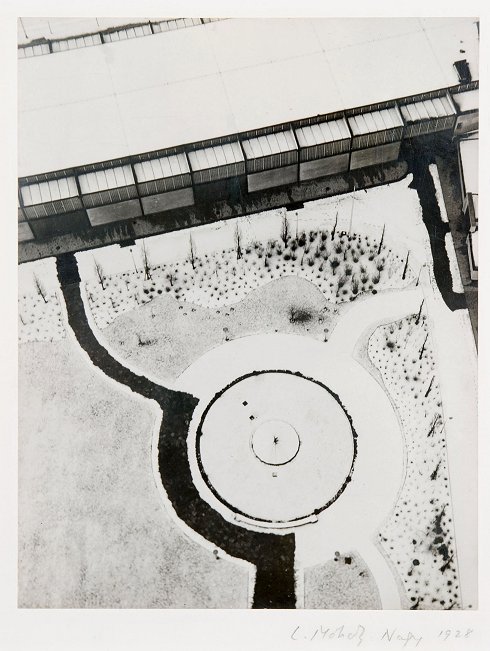
Naast een tiental schilderijen uit de periode 1922-1926, worden zijn belangrijkste films en meer dan honderd fotowerken van Moholy-Nagy in de tentoonstelling getoond. In de jaren dertig onderhield Moholy-Nagy intensieve banden met Nederland, hij woonde en werkte er zelfs twee jaar als art-director en legde er contact met Piet Mondriaan en Theo van Doesburg. In de tentoonstelling zijn dan ook verwante werken te zien van onder anderen Paul Schuitema, Piet Zwart en Gerard Kiljan. Naast grote namen uit de historische avant-garde als Piet Zwart, Georges Vantongerloo en Man Ray, past ook Moholy-Nagy uitstekend in het tentoonstellings- en collectiebeleid van het Gemeentemuseum Den Haag.
De tentoonstelling is tot stand gekomen in samenwerking met La Fabrica in Madrid (curator: Oliva Mario Rubio), Circulo de Bellas Artes in Madrid en Martin Gropius Bau in Berlijn. Bij de tentoonstelling is een Nederlandstalige catalogus verschenen, met essays van Oliva Maria Rubio (gastcurator), Vincenzo Vitiello, Frans Peterse, Hubertus von Amelunxen, Oliver A.I. Botar, Jeanpaul Goergen en Hattula Moholy-Nagy. (d’jonge Hond, ISBN 978-90-89101-95-2, verkoopprijs 49,50 euro)
fleursdumal.nl magazine
More in: Bauhaus, Constructivism
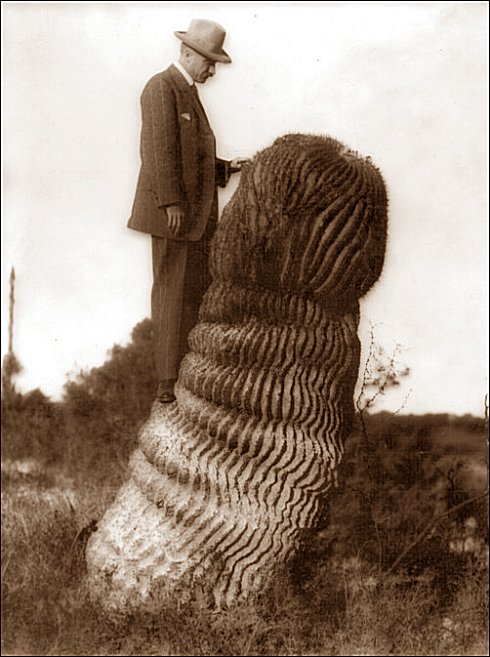
Camera obscura: Investigation
fleursdumal.nl magazine
More in: Camera Obscura
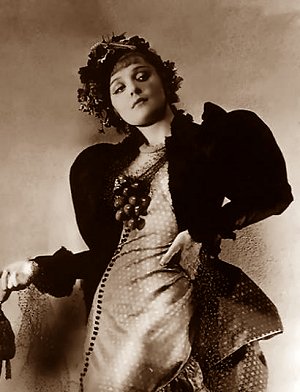
Renée Vivien
(1877-1909)
The Shop of Ideas
In an old quarter of the city, I discovered a strange little boutique where no shop window and no signboard attracted attention, and in which no one haggled, nor watched those strolling by.
I entered. A man, of whom I could see nothing but a silhouette, so impenetrable was the shadow around us, appeared without a sound.
"What, in fact, do you sell here?", I demanded of him in the thoughtlessness of my surprise.
"Ideas", he replied to me, in a very simple tone.
He grasped a small box and, began to rummage around in the dust:
"Would you be an utopian, by chance? Pardon the indiscretion. Do you want ideas of peace and of universal happiness? They are not dear and I have many for sale at the moment. Take them, and you may have the whole lot for 2 fr.50."
And, before my gesture of refusal:
"Ah! you have sense: I do not guarantee their solidity. Now, here is a financial idea, but it is extremely rare and costly. I could not surrender it to you for less than three thousand francs."
"Devil! did I, three thousand francs, that’s…"
He calmly interrupted me.
"An idea less new than this one has made the fortune of a founder of American trusts. I have not profited personally, because being too rich would bore me. I would lose my friends and the respect of the quarter."
Something like a reflection of gold shone between his fingers.
"Now if, like me, you despise opulence, or if, which is more probable, this idea seems too high priced for you, here is, at a very good value, the dream of a poet. Three sous, this is reasonable, don’t you find?"
And he showed me a glimmer of rainbow imprisoned in a box of colours.
"Finally, as you appear to me to belong to the serious clientele, I propose to you (your countenance is creased with a grimace which should have been a smile) the magnificent idea of a libertine, all but made new, you know, and of an exceptional refinement. I would let you have it for a thousand francs. It is worth more, but this is so that you will return often to buy others from me. I truly have a collection without equal."
"Yes", I said, "but some of your merchandise seems to me to be well used."
"Ah!", he replied with pride, "these, like antique furniture, are justly the most appreciated by my clientele. But do you see nothing that can satisfy you?"
"I desire an idea that you can never sell me: an idea of my own."
.jpg)
Renée Vivien prose poem
kempis.nl poetry magazine
More in: Vivien, Renée
.jpg)
Georg Trakl
(1887-1914)
An die Verstummten
O, der Wahnsinn der großen Stadt, da am Abend
An schwarzer Mauer verkrüppelte Bäume starren,
Aus silberner Maske der Geist des Bösen schaut;
Licht mit magnetischer Geißel die steinerne Nacht verdrängt.
O, das versunkene Läuten der Abendglocken.
Hure, die in eisigen Schauern ein totes Kindlein gebärt.
Rasend peitscht Gottes Zorn die Stirne des Besessenen,
Purpurne Seuche, Hunger, der grüne Augen zerbricht.
O, das gräßliche Lachen des Golds.
Aber stille blutet in dunkler Höhle stummere Menschheit,
Fügt aus harten Metallen das erlösende Haupt.
.jpg)
Georg Trakl poetry
kempis.nl poetry magazine
More in: Archive S-T, Trakl, Georg
.jpg)
Camera obscura: Blind
fleursdumal.nl magazine
More in: Camera Obscura
.jpg)
Mikhail Yuryevich Lermontov
(Михаи́л Ю́рьевич Ле́рмонтов 1814 – 1841)
On the death of the poet
The poet is no more! He’s fallen
A slave to honour –
Lead in his chest, for vengeance calling,
The proud head bowed at last – he died!…
He would not brook the rankling shame
The petty calumnies, the stain
They sought to put upon his name….
Alone he stood, and now is slain!
Is slain… What use in lamentation,
Or empty choruses of praise,
Belated words of exculpation?
Say rather – Fate cut short his days!
Yet – are you blameless, you who banned
His free, brave talent out of spite,
And smouldering flames to white heat fanned
That should have been extinguished quite?
Come, be content, then – such refinement
Of pain was more than he could bear.
The lamp of genius is no longer shining,
The laurel wreath is fading now and sear.
Yet the assassin knew no hesitation
In cooly taking aim… not one
Beat missed that heart; no saving revelation
Made tremble that fell hand which held the gun….
Hard is it though indeed to credit
How came it that this common emigre,
This fortune hunter, this upstart careerist,
This poor blind tool of destiny,
Should, in his insolence, so spurn our land,
Her language and her customs fair
And spare no thought her chiefest pride to spare
Nor pause to wonder what it was – he dare,
To think ‘gainst what he raised his hand!…
So he is slain – our singer – dead and gone
Like that less-known but well-beloved one
Of whom he told in wondrous poetry,
Who, like him by a ruthless hand undone,
A victim fell to senseless jealousy.
Why did he leave his peaceable pursuits and friendships
For this false world of harsh constraint and envy
To free and ardent heart so straight a pen?
Why did he give his hand to futile tattlers?
Why did he credence lend to liers, flatterers,
Who from his youth had been a judge of men?…
They’ve robbed him of his crown and set a crown of thorns
All wound about with laurel on him now
The hidden spikes have deeply torn
The poet’s glorious brow;
And even his last moments were envenomed
By gossips ill-disposed and vulgar whispering
And so he died – filled with vain thirst for vengeance
And plagued by broken hopes fast festering….
The splendid songs will sound no more,
To silence must the great voice yield
In that small room without a door….
And – ah! – those lips are sealed.
– – – – – –
But as for you, you arrogant descendants
Of fathers famed for their base infamies
Who, with a slavish heel, have spurned the remnants
Of nobler but less favoured families!
Who throng the throne, alert for gain – and gory
As executioners who cloak their vile intent
In robes of justice – so to slaughter Glory,
Freedom and Genius, seeming innocent!
But there’s God’s judgement, which fears not to wait;
A dreadful Judgement that’s not bought nor sold.
It knows your inmost thoughts, ye panders reprobate,
It does not even hear the clink of gold.
Before this seat your slanders will not sway
That Judge both just and good…
Nor all your black blood serve to wash away
The poet’s righteous blood.
.jpg)
Mikhail Lermontov poetry
kempis.nl poetry magazine
More in: Archive K-L
.jpg)
FOTO AAN DE KROEGWAND
Klaar voor de foto
het moment dat de jager als buit wordt geschoten
door een toerist, behangen met trofeeën, veroverd op buit
Gedroogde organen, tanden, vellen en poten
alles verraadt de geur van de dood
amuletten om de goden gunstig te stemmen
en middeltjes om de buit te lokken
pijlen en bogen schietklaar voor het moment van geluk
de resten van een geweer, als onderscheiding gedragen
zoals een analfabeet zijn pen als een fetisj meedraagt
rond de heupen gedrapeerd riet
als camouflage, met geur als lokspoor
Spiegeltjes schitteren op borst en rug
om ongezien aanvallers te laten schrikken
van hun eigen aanblik
Ton van Reen
Ton van Reen: De naam van het mes. Afrikaanse gedichten. In 2007 verschenen onder de titel: De straat is van de mannen bij BnM Uitgevers in De Contrabas reeks. ISBN 9789077907993 – 56 pagina’s – paperback
kempis.nl poetry magazine
More in: -De naam van het mes, Reen, Ton van
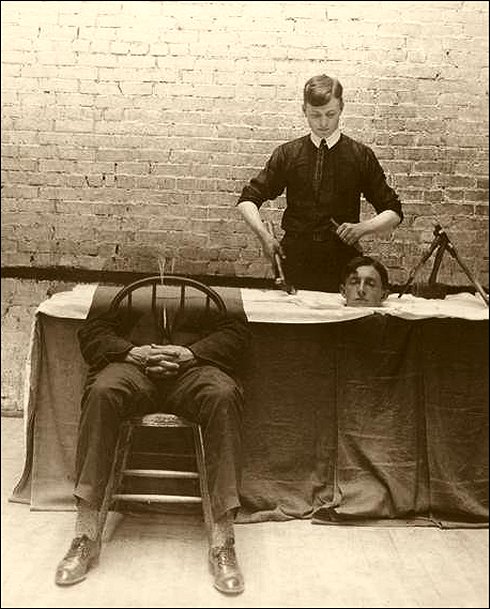
Camera obscura: Head Hunter
fleursdumal.nl magazine
More in: Camera Obscura
.jpg)
Paul Boldt
(1885-1921)
DER DICHTER
Die Antlitzlast auf seinen Schädelknochen,
Wie ein Museum, und die Schmerzen hängen
In großen Augen, blicklos und gebrochen,
Und in dem Mund, verzerrt von den Gesängen.
Es kommt heraus, Dunkles des Blutes, quillt.
Er wird wahnsinnig aus Liebhaberei.
Sein Mund geht lüstern auf. Er lächelt wild.
Hinter die Zähne bergend seinen Schrei.
Paul Boldt poetry
fleursdumal.nl magazine
More in: Archive A-B, Boldt, Paul, Expressionism
Thank you for reading Fleurs du Mal - magazine for art & literature